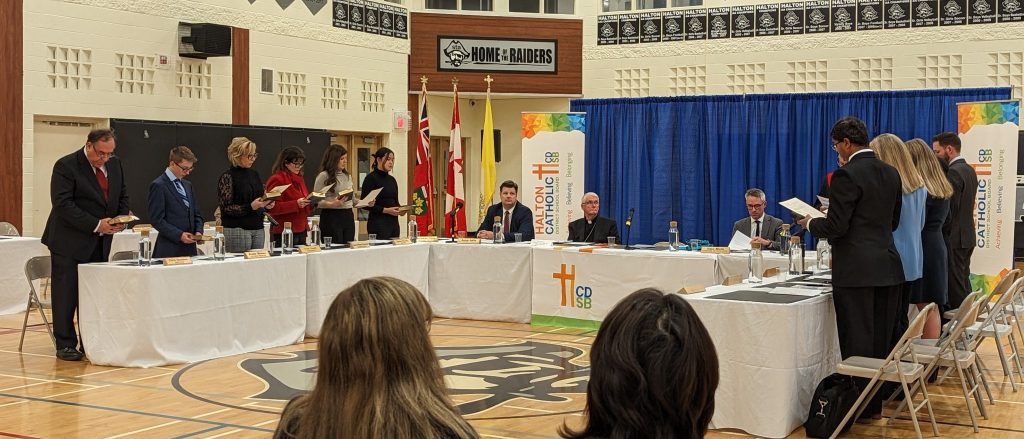|
Getting your Trinity Audio player ready...
|
Senior year of high school can be an exciting yet overwhelming time. The weight of the future is ever-present as students grapple with the question of what to do after Grade 12. College or a gap year? University or an apprenticeship? Those aspiring to attend post-secondary must navigate the labyrinth of selecting a program and school, and then submitting applications. It can feel like pressure is coming from all directions – parental expectations, teacher guidance, personal dreams and the inevitable comparisons to peers.
To better understand what it’s like to navigate this pivotal milestone in 2023, CareerWise Editor Lindsay Purchase interviewed high school senior Arianna Chua about how it feels to think about life after high school, their experience of career education and their advice for their peers.
This article is part of a five-article CareerWise series on “Teen Career Decision Making.”
What’s coming up for you in your Grade 12 year?
My vision, if it goes as planned, is applying to universities. I have two in mind: Western Ivy for a political science and honours business dual degree, or the University of Ottawa, for their honours political science and public administration degrees. I don’t really know which one I would choose over the other.
I’ve been very involved within my school community, and my community in general, ever since I was in Grade 9. For my school board, I serve as student trustee for my region. That’s really what sparked why I wanted to go into political science and why I’m applying to those programs. I’m also the president of my student council.
How are you feeling heading into this year?
I would say, confused, stressed – those sort of emotions. Because, you know, it is your final year of high school. It’s, like, make it or break it. If you don’t get the grade that you want to achieve, then you can’t get into your post-secondary institution that you want to go to.
It’s kind of sad leaving my K to 12 education, especially high school. Being a part of my school board, I’m able to make motions and make initiatives that will last throughout generations. There’s so much that I want to do within regional and provincial politics that I only have the opportunity to do now. I’m trying to squish everything in.
How does it feel to think about what comes after high school?
After high school, I think it’s just very unpredictable. And it’s kind of unsure and scary, just because the job market right now is honestly crashing. I’ve been trying to look for a part-time job just to help fund my post-secondary education and there’s no openings available for where I live. It’s very scary and stressing that there’s no set security.
Even in the sense of buying a home and that sort of stuff. That’s something that I know for previous generations, that was a goal of theirs in their life. But I feel like now, especially with Generation Z and myself, that’s not really something tangible that you could do, because the housing market is insane. It’s kind of scary that sometimes things might not go your way and that might affect you negatively. So, overall, a little bit of stress and a little bit of, I don’t know what I’m doing.
Did you always plan to go to university or did you think about other options?
When I was in Grade 7, I wanted to actually become a chef. I realized that that was not tangible, because of the training and the cost of chef school. But again, when I got more involved in my community, I knew political science was the path for me, just because I love the impact that I can make in that field. And I know to go into political science, the most generic route that people take is university.

Are a lot of people in your life asking you about your plans for after high school?
All the time – especially teachers, and parents and aunts and uncles. And guidance counsellors are coming to you saying, “Hey, what’s your plan? How can we get you there?” I do appreciate their help and them wanting to help me get to my goals. But it is a little bit stressful, especially with parents and aunts and uncles, because they want to see you in a place that sometimes you don’t want to be in. In my younger years of high school, I was directed into nursing, which really wasn’t for me. But I’m glad that I was able to find myself a little bit with getting involved and also with the help of my guidance counsellor.
What’s your experience been like of having family voices in your decision making?
When I was younger, it was very much like, “Are you sure you want to pursue an arts degree?” Because notoriously, in the media, it’s shown that it’s not employable. The more and more that I’ve shown them that I do love this, and that this is an employable degree and skill to have, they have been way more supporting. But they give me some down-to-Earth knowledge as well – like maybe you should minor or dual-degree in business just in case you need to have a backup, which I do appreciate.
Did you have support from guidance counselors or teachers on how to talk about opportunities in the arts with your family? Or was that was coming from you?
Initially, this was something that was coming from me. I never thought an arts degree was something that I would pursue, because I didn’t understand how amazing it could be. When I was approached by my teachers and by my guidance counsellors, they were very supporting of what I wanted to do, just because they see the potential and what can come from those degrees. I love how teachers and guidance counsellors, they direct you in a way where they want you to follow your passions, and they help you make that passion employable.
What has career education or career learning looked like for you during high school?
It all started in Grade 10, with our civics and careers classes. I think – and many students would agree with me – it wasn’t exactly the best to help figure out career pathways, only because it is so short. You’re not able to dive deep into what you want to do.
“It is a conversation that I have maybe every single day. It’s something that we’re thinking about a lot.”
But then in Grade 11, I did a co-op with my MP in Milton. Some students tend to lean away from co-op because of scheduling, but I found it very worth it. It helped me understand the functions within federal government, within constituency offices, but also made me realize, yeah, I really do want to do this.
Are you talking with friends about what everyone is thinking of doing after high school?
It’s all that everyone can talk about right now. My school is very diverse in where people want to go to. There’s a bit more students who want to go into university, but I do like talking to my friends who want to pursue the skilled trades and who want to pursue college degrees. I know the skilled trades are a bigger thing right now, and my school actually has a really good skilled trades program for cars and plumbing. But yeah, it is a conversation that I have maybe every single day. It’s something that we’re thinking about a lot.
Are people generally more excited? Stressed? What’s the vibe?
I would say it’s mostly stress, just because university applications haven’t happened yet. I feel like in May, it’s going to be a little bit more exciting, because people will be into their programs. Right now, especially for people who want to get into medicine or computer science, it is a lot of stress for them. But also, for other students, it’s exciting, because some people just want to get out of high school.
You attended part of high school virtually, because of the pandemic. Does that affect how prepared you feel for what comes after high school?
Yeah, 1,000%. Especially within mathematics, because math is not my strong suit. Students are still struggling, because they don’t know the basic foundations of Grade 9 and 10 math. Thank God, I’m going into an arts degree, so it won’t really matter to me. Students are still concerned that the effects of the pandemic, so the lower-quality math education, is going to affect them. And of course, how universities are going to perceive that.
If you were talking to someone who was really struggling with deciding what to do after high school, what would you tell them?
Personally, I would say cater to your interests. STEM road, of course, is not the only success. I know society has gaslit us to think that STEM is the only way you can get a job, but pursuing other pathways that you want to explore is worth it. Not only will you be employed – you will also be employed in the job that you love and that’s what matters the most.
And it’s okay to change what you like, because people want to be different things in different parts of their life. So it’s okay to make mistakes, it’s okay to make a different decision. And whatever option you choose, it will be okay in the end.
This interview has been edited for length and clarity.




